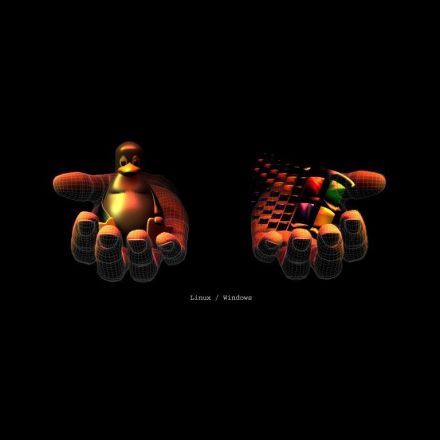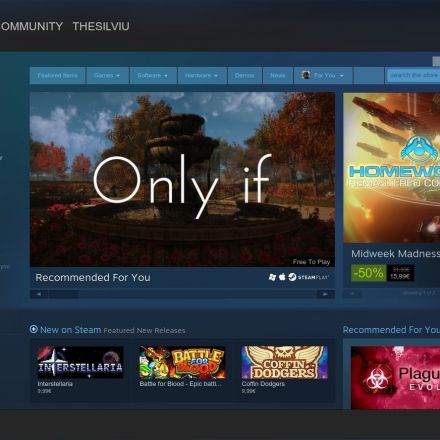Thank you
Your email has been added to our waiting list and we will send an invite to you as soon as possible. Thank you for your patience.
In the meantime, if you happen to run a blog, our newly launched Blog Enhancement Suite can utilize the immense power of community to help you get more audience, engagement, content, and revenue with your own embeddable community! It will breathe new life into your blog and can automate many of the tedious tasks that come with the territory, so you can focus more on what matters most... writing.
Help spread the word about Snapzu:
Let others know about Snapzu by tweeting about us. We appreciate every mention!
Tweet it!





























Join the Discussion
While I absolutely love the free and open nature of Desktop Linux, it's something that I can never stick with for longer than a couple weeks. There are several big issues I have with it that will likely never be fixed (at least without something seriously shaking consumer trust in Windows).
Firstly, I'm a student. When I am working on a project, I don't want to be messing around with Openoffice, Libre Office, or whatever else. I want to know that whatever I put down on the page in my word processor is the same exact document that will be coming up on my Professor's computer. With some of my classes, just being a line or two long or short, due to changes of how the characters are displayed on the page, can be a big deal. Microsoft Office is more or less expected in the educational world, as well as the professional world. Using another office suite, while entirely doable, just seems like one more risk and something to make sure works.
Secondly, when I'm not doing school related stuff on the computer, I'm playing games. While the gaming market is slowly becoming more inclusive of Linux, the majority of games don't support it. Yes, there are things like Wine that make games possible, I want to get the very most out of my gaming rig. Running games through emulation seems like it would be a hit to performance and perhaps response time.
Thirdly, I get Windows free. Sure, it's not opensource like Linux is, but when the pricetag is the same, why pass off on Windows? The Windows operating system is given for free through my University. Even for those who don't get free licenses, almost all new computers are sold with a copy. The only two remaining groups are people who are using old hardware, or who are building their computer from scratch. Windows 10 is free for users running Windows 7 or 8.1. What that means, is for anyone who bought (not built) a computer in the last five and a half years has the latest Windows operating system for free. Essentially the only people who don't have a free license are people who build their own computers, or have very old technology.
Essentially, the main problems I see in expanding adoption of Desktop Linux stem from two issues. First - Linux needs more developers in applications and games. Without the productivity and entertainment applications Windows and OSX users expect, users who try desktop Linux will quickly lose interest or grow frustrated. Secondly, there's an extremely small market for people who need a free operating system.
[This comment was removed]
I actually had a bit of a discussion about this recently, one of the factors, that nobody wants to talk about, is just flat out because of fragmentation. There is no "reference" linux distribution, and until there is, there's zero chance of any sort of widespread use on the desktop. And that primarily comes back to what /u/fewt is talking about, the "community"
Nobody can agree on a damn thing. Debian wants to do things one way, Redhat/Fedora another, openSUSE/SUSE a third, Gentoo, Slackware, and don't even get me started on Ubuntu/Canonical. And that's fine, viva differences!
But it doesn't make for a unified experience. And that's never going to bring in your average $desktop_user. They just want to be able to install something, and have one place, or at least an easily googleable place to find answers if something goes wrong. They don't give a shit what philosophical reasons the developers chose one init system over another, or whether it's GNOME or KDE that they're staring at. Most users never change the default desktop in the first damn place.
And a "reference" won't ever happen.
The Debian/Gentoo/Slackware crowd generally distrusts any corporate Interests (and not neccessarily wrongly in all cases)
RedHat, and by extension Fedora and CentOS, well, RedHat has a business to run, and they need to differentiate themselves.
SUSE/openSUSE, same thing as RedHat.
Ubuntu/Canonical, well, the less said, the better, they've come the closest to a brain dead simple End-User distribution so far, but a huge swath of the FOSS world can't stand them.
So who do you put in charge? Nobody trusts anybody else, you put anybody with commercial interests in charge of a "reference" and there goes a bunch of developers for philosophical reasons. You put the Community in charge? Nothing ever fucking gets done, and every decision gets weighed down in personal fights and idiotic bikeshedding.
You make some version of GNOME the default desktop? You just pissed off 3/4 of the users, so you pick KDE, wow, you still pissed off 3/4, you pick something else, hey, 3/4 of the world is still pissed off!
We can't even get everybody to conform to FHS or the LSB, and until the point that you can go to your average website, and have a link there for $nifty_program that just says Linux, without any provisos (even if that link just ties back to the distribution repos and installs it through whatever your package manager is) it ain't happening, and none of these articles are anything but pointless handwringing.
[This comment was removed]
We? Maybe you don't,but I've used Linux as my main os 12 years come Sept. so don't hand me that cause I don't buy it.
Good point, most people wouldn't be able to go full open source without giving some convenience but it can certainly be done, depending on what your doing.
The real reason adoption hasn't increased is swept under the rug and not discussed, in my mind it may actually be the number one reason holding back the increased adoption of what people call "Desktop Linux", it's the community itself.
When users seeking help get responses to requests for help like "send us patches", when contributors get responses like "we won't accept your patch, keep it downstream", or when bug reports get ignored for years because developers hack on the software you need fixed for fun rather than for profit and fixing bugs well that's not fun, the FOSS house of cards falls down.
People have been writing articles like this one for years, along with ZOMG YEAR OF LINUX DESKTOP!!11, but no-one has really truly addressed the elephant in the room that's holding the platform back.
I spent years fixing bugs for my user base, and I've submitted many patches upstream with a zero acceptance rate...now I own a Mac.